Japanese Beginners Guide
![]() This guide was written for Japanese Beginners that don’t know where to start learning the Japanese language.
This guide was written for Japanese Beginners that don’t know where to start learning the Japanese language.
Why Learn Japanese?
Japanese has spoken by over 140 million in Japan alone and is also a natural second language for people in Chinese and Korean speaking countries. Despite Japan’s growth being outshined by neighbour countries like China and India.
Japan still has the second largest economy in the world following China.
Japan has a fascinating culture and a terribly difficult language to go along with it. To make matters worse, the majority of Japanese will have zero ability to speak or even understand English. If you’re taking a trip to Japan, pressure’s on you to get up to speed or spend the majority of the time frustrated.
Learning Basic Japanese
Learning Japanese isn’t an easy decision to make, as you know it isn’t something you can do overnight. Not only do you have to learn how to speak in Japanese, but you must learn a new alphabet and how its used in reading and writing. There is definitely more to learn this language than simply learning some new vocabulary words! But you shouldn’t feel that it’s something that’s impossible either. This is something you can definitely do if you make up your mind to do it. It is a lot simpler if you use some proven techniques in your course of study. The following suggestions will make it easier for you to get started.
Everyone learns differently.
One learning style that is best for some people is to listen to as much as possible and then phonetically write it out.
If you are more of a writer, you may want to first learn the alphabet and how to write in the new language. You are, however, better off sticking with one method or the other, as you have to familiarize yourself with this new way of both writing and speaking. If you switch back and forth, you will find that you’ll be making the process even more difficult than it has to be. All you have to do is start by taking your own learning preferences into account.
Japanese Language Difficulty
Expect to work extra hard when trying to read and write Japanese. Spoken Japanese will sound daunting at first, especially when you hear native speakers using it among themselves. Once you come to terms with the differences in grammar and build up your vocabulary, it’s actually simpler than a lot of exotic languages.
Start small with Japanese.
The easy route to learning a new language is to get a basic vocabulary established and then moving on to writing assignments and grammar later. Be careful of trying to learn all of the names of a particular object; all languages have lots of ways of saying the same thing. Many words people don’t use in everyday day language or sound strange when used in a conversation so your job is to use a small few of the most common words that get your thoughts across. When you start to recognize when it is appropriate to use one word over another in a given situation is the time that you can start to build a more complicated vocabulary. Being able to comprehend the small differences words that are similar is a major step in learning a language and is a signal that you have advanced past the beginner’s level.
Japanese Flash cards are a simple language learning tool that can really help. Japanese is a complicated language, and you will really need a few sets of flashcards for different purposes. You’ll want a set that helps you learn your vocabulary and grammar. Then you can get a set that teaches you the characters and how to start reading in Japanese.
Use Japanese on one side and then spell out the answers phonetically on the other side of the cards. Study one set of cards at a time and don’t get them confused, or you will make the process a lot harder on yourself!
It takes a certain amount of ambition and even courage to start learning Japanese. There is no denying that Japanese can be a hard language to learn, but once you do you’ll have a lifelong skill! It will also open all sorts of doors for you for travel and culture!
You’d be able to Visit Japan and experience Japanse Culture
Contents
Japanese Alphabet
Learning to read the Japanese Alphabet should be the first stop for Japanese beginners.
Japanese has probably the most confusing alphabet system for beginners.
Learn Japanese Alphabet consists of [su_highlight]3 different Alphabets[/su_highlight] that are used in different circumstances or sometimes used together to form words and phrases.
The Japanese alphabet is overall known as Kana, consisting of three alphabets:
- Hiragana
- Katakana
- Kanji.
The Japanese alphabet overall is [su_highlight]phonetic alphabet where each symbol is a spoken syllable that represents a single sound[/su_highlight].
Essentially every Japanese word is written exactly how they are pronounced.
When to Use Hiragana Alphabet
• Hiragana expresses the grammatical relationship between them (endings of adjectives and verbs)
• Hiragana is used to represent native Japanese words.
Japanese Alphabet Hiragana is a phonetic alphabet that contains 48 syllables that be sounded out to pronounce the word. Hiragana has characteristic cursive characters.
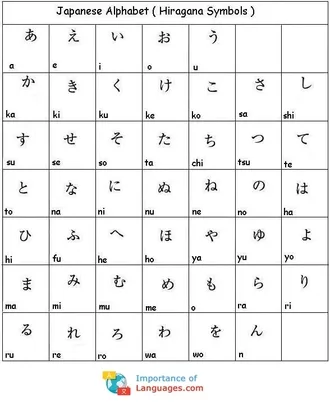
When to Use Katakana Alphabet
• Foreign names and words of foreign origin.
• Foreign places
• Words of Foreign origins.
Japanese Alphabet Katakana is also a syllabic alphabet. There are 48 Katakana symbols that have similar sounds to Hiragana.
It is no coincidence that there is the same number of characters in both the Hiragana and Katakana alphabets as they both represent exactly the same sounds (some of them even look quite similar).
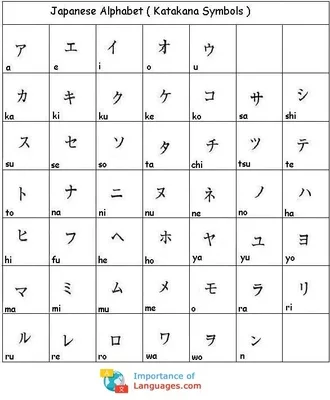
When to Use Kanji Alphabet
There is a third form of Japanese Alphabet that borrows or modifies Chinese Characters called Kanji. Kanji was borrowed from Chinese writing at a time when there was no written Japanese language and it is still around. Japanese Kanji has different meanings than Chinese characters today.
There are over 8000 Kanji. Kanji are not syllabic and are used to represent abstract concepts as well as names and everyday words. An average adult Japanese speaker must know at least 2000 off by heart. Although you don’t need to memorizes all of the Kanji. Each Kanji has several different meanings and pronunciations.
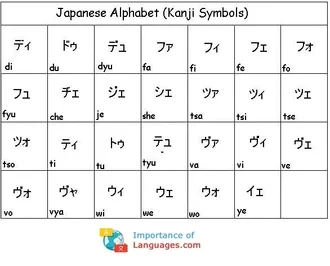
Japanese words are pronounced exactly as the symbols show but one thing to pay attention to is if the character has a diacritic mark above it or not.
Make sure to practice pronouncing and writing the Japanese Alphabet whenever you can. As many times as you can.
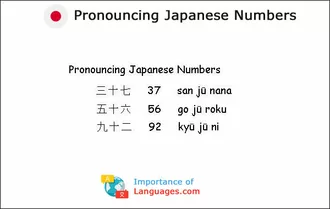
Because Japanese has three different alphabets: Hiragana, Katakana, and Kanji. Hiragana and Katakana are pretty similar with roughly 48 symbols each( some used, some not. Hiragana is for general use while Katakana is used for foreign names, the names of foreign places and words of foreign origin. Kanji are characters that are burrowed or modified from Chinese. Japanese number system is a lot easier to learn.
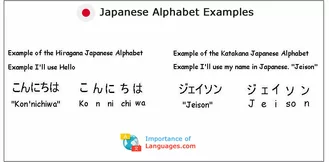
Japanese Number System
Understanding how to write Japanese numbers should take very little time and effort to learn.
Understanding how to write Japanese numbers is really that simple to learn. Only takes an hour or two to fully memorizes the Japanese number system.
Japanese Numbers are written from Left to Right.
Japanese Numbers from 1 – 100
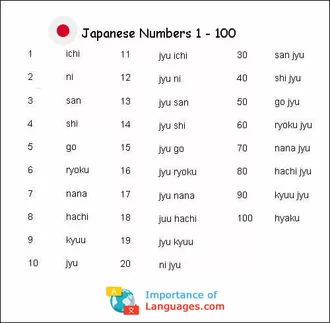
You basically write the Japanese Characters in order. If the number is a double or triple digit number you write the Number times Position, Number times Position.
It’s actually pretty straightforward when it comes to learning how to use the Japanese number system. Pronouncing Japanese numbers is just as easy to learn.
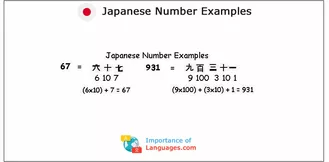
You really just need to memorizes how to pronounce the base Japanese Numbers then you can easily pronounce any Japanese number. I personally choose to remember that Japanese numbers follow a “number-position” type pattern. Example of what I mean..

Japanese Vocabulary and Phrases
The logical next step for Japanese beginners after learning the Japanese Alphabet would be to start developing your Japanese vocabulary with Japanese words and phrases.
Japanese Grammar
English and Japanese grammar are along the same levels when it comes to difficulty. They’re widely different, though, and a lot of your early struggles will have to do with learning all the new concepts. Most of the vocabulary will either be Japanese in origin or derived from Chinese, so there’s little chance you’ll recognize a lot of them.
The Japanese grammar rules you must follow and understand to properly speak the Japanese language.
- Japanese Sentence Structure is usually put the Object of the sentence ahead of the Verb/Adjective or simpified to Subject-Object-Verb.
- Japanese nouns don’t have any gender associated with them. Japanese pronouns are rarely or never used.
- Japanese also takes into consideration the social status of the person you are speaking to.
- Japanese uses more verbs then any other language and they don’t change with number, gender, or person.
- There are two types of Japanese Adjectives. They are “-i adjectives” and “-na adjectives”.
Japanese Grammar Rules
The fun part of learning any language.. Grammar!
The “rules” you must follow to properly speak a language. But don’t worry about how hard learning Japanese Grammar might feel at first. Learning Japanese grammar rules is one of the most effective ways to speed up your ability to speak a language.
Keep in mind this is just a basic introduction to understanding how Japanese grammar works
Japanese Grammar Rules: Sentence Structure
• Japanese Sentence Structure is usually put the Object of the Sentence ahead of the Verb/Adjective.
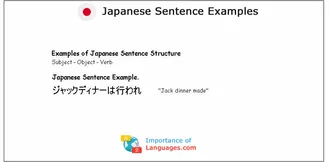
Japanese Grammar Rules: Nouns and Pronouns
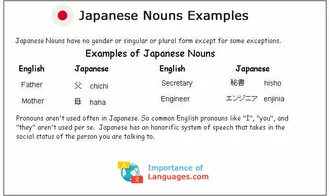
• Japanese Nouns don’t have a masculine or feminine form to remember.
• The Use of Pronouns in Japanese is very limited or almost non-exist
• Japanese uses more particles and verbs to deal with the loss of pronouns.
Japanese Grammar Rules: Verbs
• The Japanese have two tenses: The simple present and the simple past.
• Verbs in Japanese grammar also do not change with number, gender or person
• Verbs are the essence of Japanese Sentences. Using more verbs then any other language.
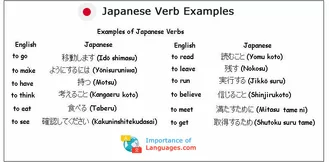
Japanese Grammar Rules: Adjectives
• There are two types of Japanese Adjectives. They are “-i adjectives” and “-na adjectives”
• “-i adjectives” are original Japanese words while -na adjectives are burrowed from other languages.
• “-i adjectives” tend to blur the line between adjectives and verbs
• “-na adjectives” modifies nouns but not predicates
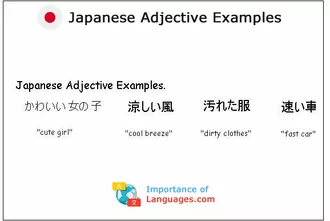
Common Japanese Words
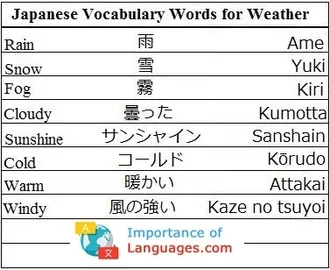
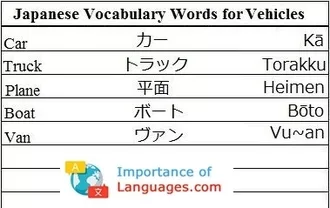
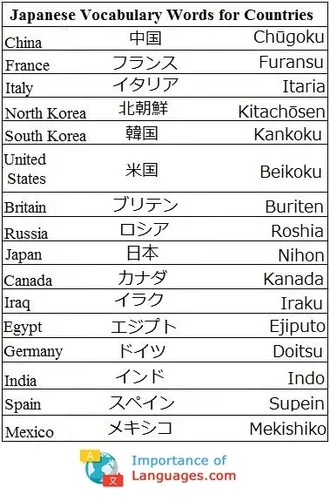
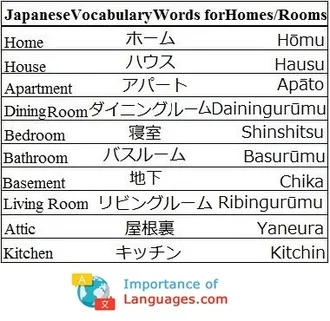
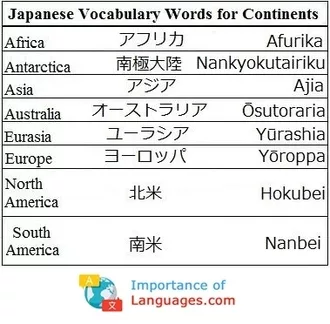
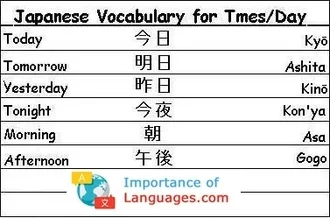
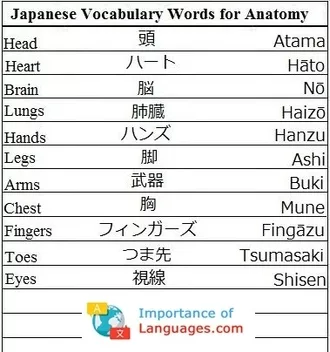
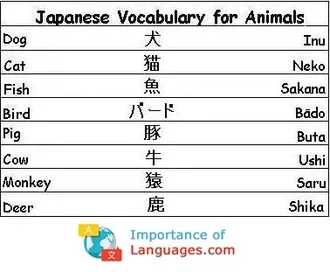
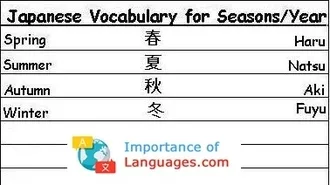
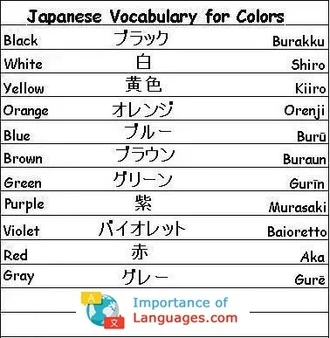
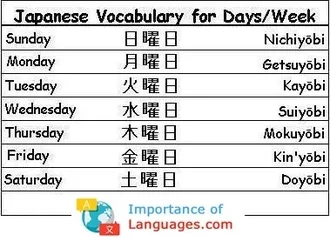
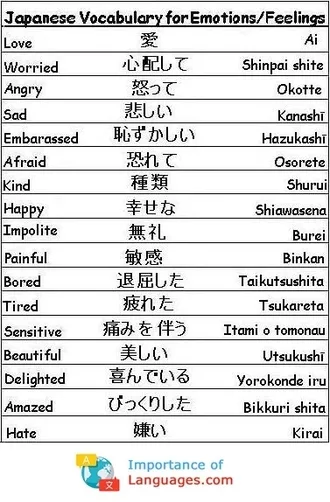
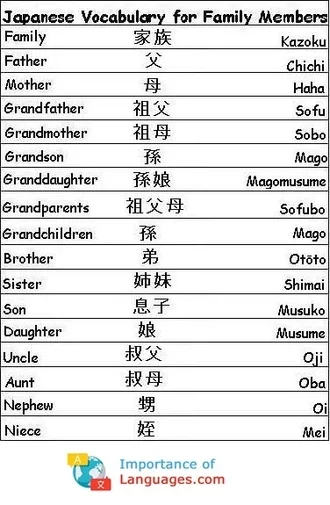
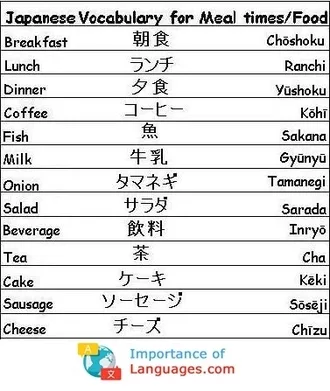
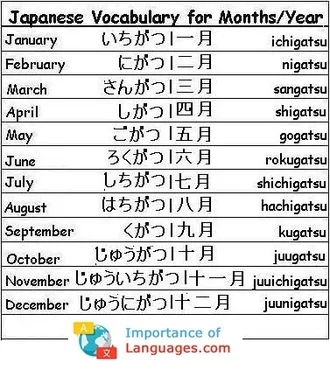
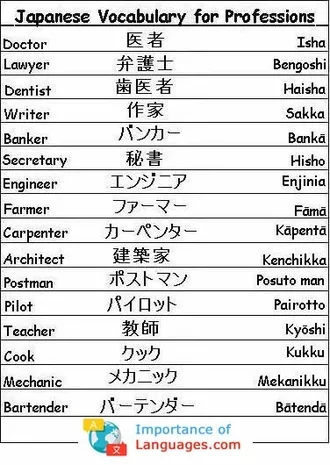
Consider Using a Japanese Language Learning Program

If you are really serious about learning Japanese and want to maximize your time then you should consider using a Japanese language course to further aid you in your quest to learn Japanese.
There are several great programs out there that deliver a great language learning experience. The advantages of a language learning program in the organization and having a next step already lined up.
Most break down the lessons into 30-minute intervals that can fit into any type of schedule. Flexible to retry a lesson to make sure you understand what you are learning and give you confidence in succeeding.
Examples of great Japanese language Programs can be found below.


Do not trust those Japanese vocabulary charts. They are not accurate.
Hello Daniel
Can you explain the mistakes?
Hello,
Your vocabulary lists are full of mistakes. Either you used Google translate with ZERO knowledge of Japanese language, or you are just teaching people to speak English with a Japanese accent.
Japanese people don’t say コールド to say cold. They say さむい or つめたい. A Japanese person might understand your charts, but not because it’s Japanese, but because they know some English.
You obviously have also no knowledge of what is the correct grammar to use in your charts, and a lot of words are translated by words with a complete different meaning. Which just shows that you have no idea what you are doing here.
Please contact me if you want me to help you correct the charts.
Hello
Thanks for the spotting the mistakes. We will update the website
Hello Sally my name is Miranda. I would like some help translating some Japanese letters, can you please email me so I can show you, I can unfortunately type them.
Learning Japanese in Japan;If you want to travel to Japan, learn about Japanese culture, or even just interact with Japanese people, being able to speak even a small amount of this language will make your Japanese experience so much better. This course will familiarize you with Japanese basics in a quick and easy manner. Japanese is spoken by over 120 million people worldwide,only in Japan but also in large migrant communities in the United States of America, Brazil,and across East Asia.This course will help you to speed basics of the Japanese language and Japan has incredible tourist destination rich in history and character,as well as very important country for global trade and commerce.Next times, you will be taught how to pronounce Japanese words with phrases.This will give you much more confidence when travelling around Japan or speaking with the Japanese,and may even begin a life-long Japanese learning journey!
So are the charts accurate?I’m trying to learn japanese,but don’t want to learn the wrong way.
Hi
I’ve lived in japan for ten years and DO NOT. Use this page to learn anything. About half of the stuff written here is totally wrong >< I recommended a textbook called “Genki” if you’re a beginner 🙂
hello I want to learn japaneese but I do not know how to start < sir can you please recommend me some app or some youtube channel etc from where I can learn it at home easily .
………
……..
……..
thanks!
Try doulingo it can help you